Gairdner J. History of the Life and Reign of Richard the Third: To which is Added the Story of Perkin Warbeck from Original Documents
Подождите немного. Документ загружается.

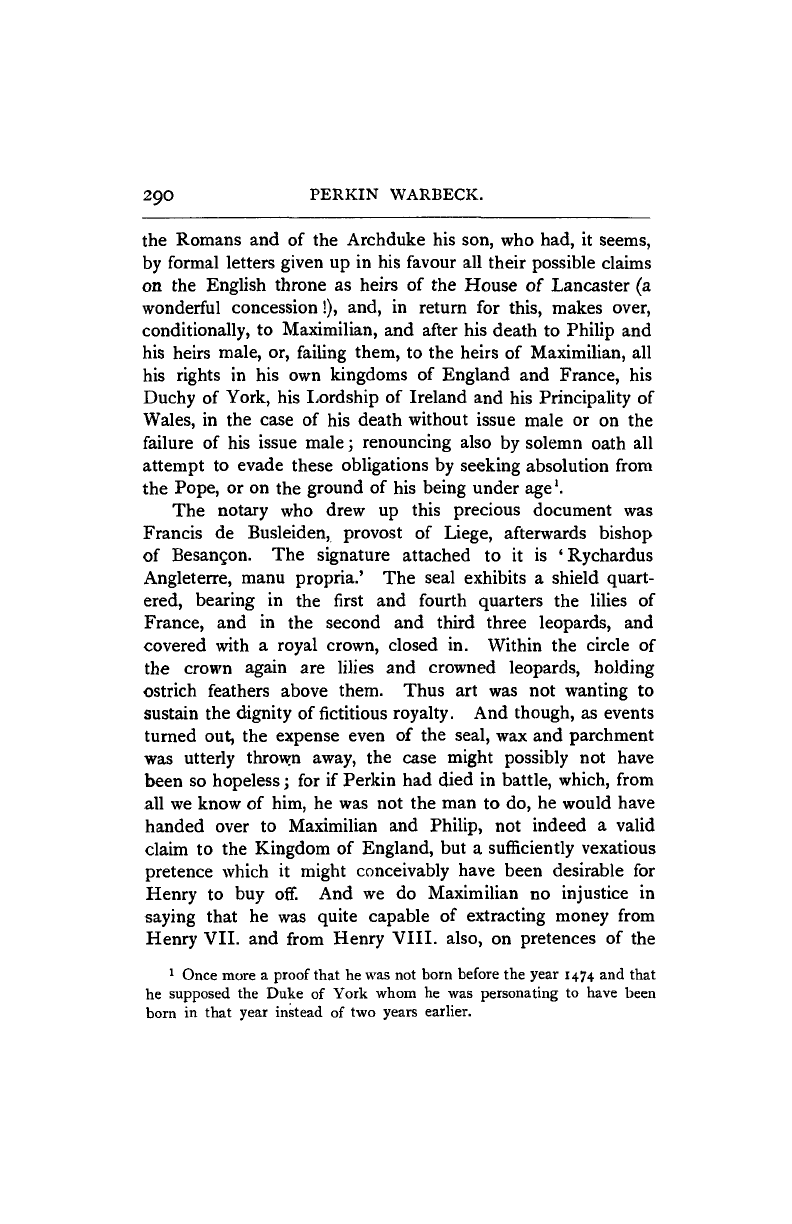
290 PERKIN WARBECK.
the Romans and of the Archduke his son, who had, it seems,
by formal letters given up in his favour all their possible claims
on the English throne as heirs of the House of Lancaster (a
wonderful concession!), and, in return for this, makes over,
conditionally, to Maximilian, and after his death to Philip and
his heirs male, or, failing them, to the heirs of Maximilian, all
his rights in his own kingdoms of England and France, his
Duchy of York, his Lordship of Ireland and his Principality of
Wales, in the case of his death without issue male or on the
failure of his issue male; renouncing also by solemn oath all
attempt to evade these obligations by seeking absolution from
the Pope, or on the ground of his being under age'.
The notary who drew up this precious document was
Francis de Busleiden, provost of Liege, afterwards bishop
of Besangon. The signature attached to it is 'Rychardus
Angleterre, manu propria.' The seal exhibits a shield quart-
ered, bearing in the first and fourth quarters the lilies of
France, and in the second and third three leopards, and
covered with a royal crown, closed in. Within the circle of
the crown again are lilies and crowned leopards, holding
ostrich feathers above them. Thus art was not wanting to
sustain the dignity of fictitious royalty. And though, as events
turned out, the expense even of the seal, wax and parchment
was utterly thrown away, the case might possibly not have
been so hopeless; for if Perkin had died in battle, which, from
all we know of him, he was not the man to do, he would have
handed over to Maximilian and Philip, not indeed a valid
claim to the Kingdom of England, but a sufficiently vexatious
pretence which it might conceivably have been desirable for
Henry to buy off. And we do Maximilian no injustice in
saying that he was quite capable of extracting money from
Henry VII. and from Henry VIII. also, on pretences of the
1
Once more a proof that he was not born before the year 1474 and that
he supposed the Duke of York whom he was personating to have been
born in that year instead of two years earlier.
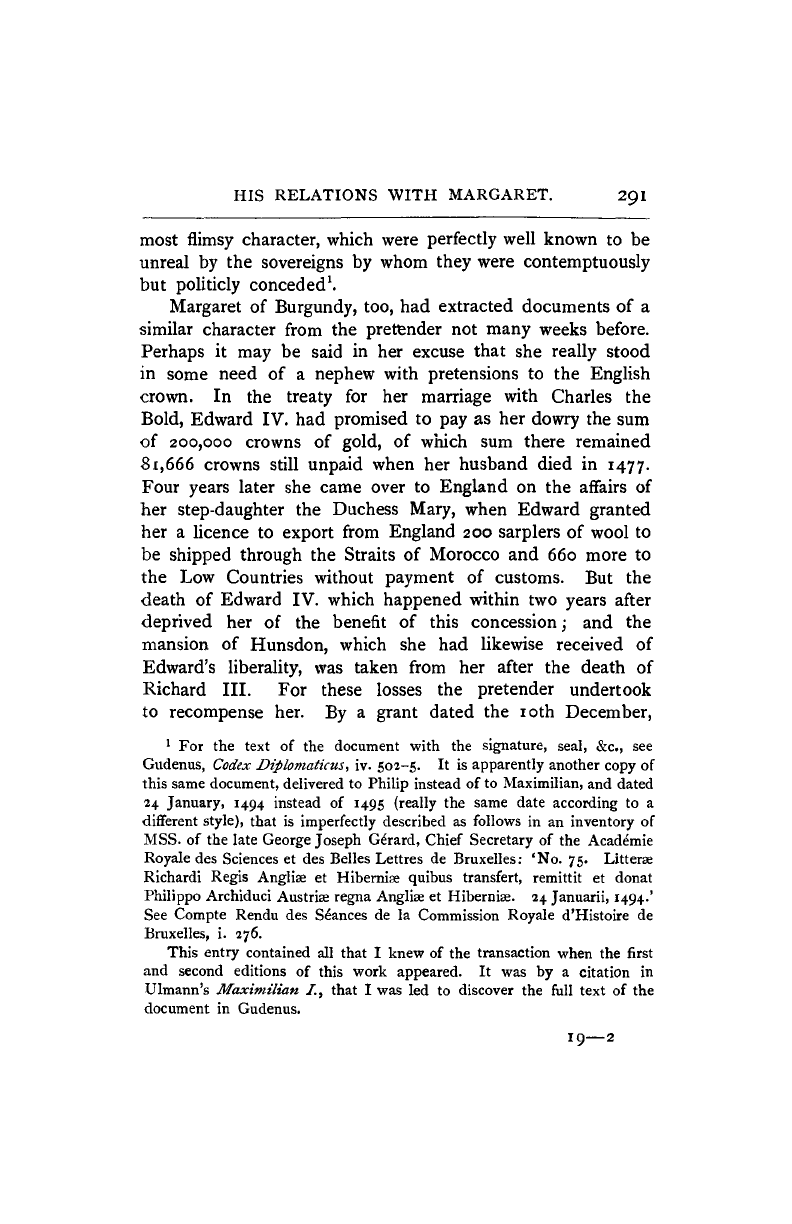
HIS RELATIONS WITH MARGARET. 291
most flimsy character, which were perfectly well known to be
unreal by the sovereigns by whom they were contemptuously
but politicly conceded
1
.
Margaret of Burgundy, too, had extracted documents of a
similar character from the pretender not many weeks before.
Perhaps it may be said in her excuse that she really stood
in some need of a nephew with pretensions to the English
crown. In the treaty for her marriage with Charles the
Bold, Edward IV. had promised to pay as her dowry the sum
of 200,000 crowns of gold, of which sum there remained
81,666 crowns still unpaid when her husband died in 1477.
Four years later she came over to England on the affairs of
her step-daughter the Duchess Mary, when Edward granted
her a licence to export from England 200 sarplers of wool to
be shipped through the Straits of Morocco and 660 more to
the Low Countries without payment of customs. But the
death of Edward IV. which happened within two years after
deprived her of the benefit of this concession; and the
mansion of Hunsdon, which she had likewise received of
Edward's liberality, was taken from her after the death of
Richard III. For these losses the pretender undertook
to recompense her. By a grant dated the 10th December,
1
For the text of the document with the signature, seal, &c, see
Gudenus,
Codex
Diplomaticus, iv. 502-5. It is apparently another copy of
this same document, delivered to Philip instead of to Maximilian, and dated
24 January, 1494 instead of 1495 (really the same date according to a
different style), that is imperfectly described as follows in an inventory of
MSS.
of the late George Joseph Gerard, Chief Secretary of the Acad&nie
Royale des Sciences et des Belles Lettres de Bruxelles: 'No. 75. Ljtterae
Richardi Regis Anglise et Hibernise quibus transfert, remittit et donat
Philippo Archiduci Austria regna Angliae et Hibernise. 24 Januarii, 1494.'
See Compte Rendu des Seances de la Commission Royale d'Histoire de
Bruxelles, i. 276.
This entry contained all that I knew of the transaction when the first
and second editions of this work appeared. It was by a citation in
Ulmann's Maximilian I., that I was led to discover the full text of the
document in Gudenus.
19—2
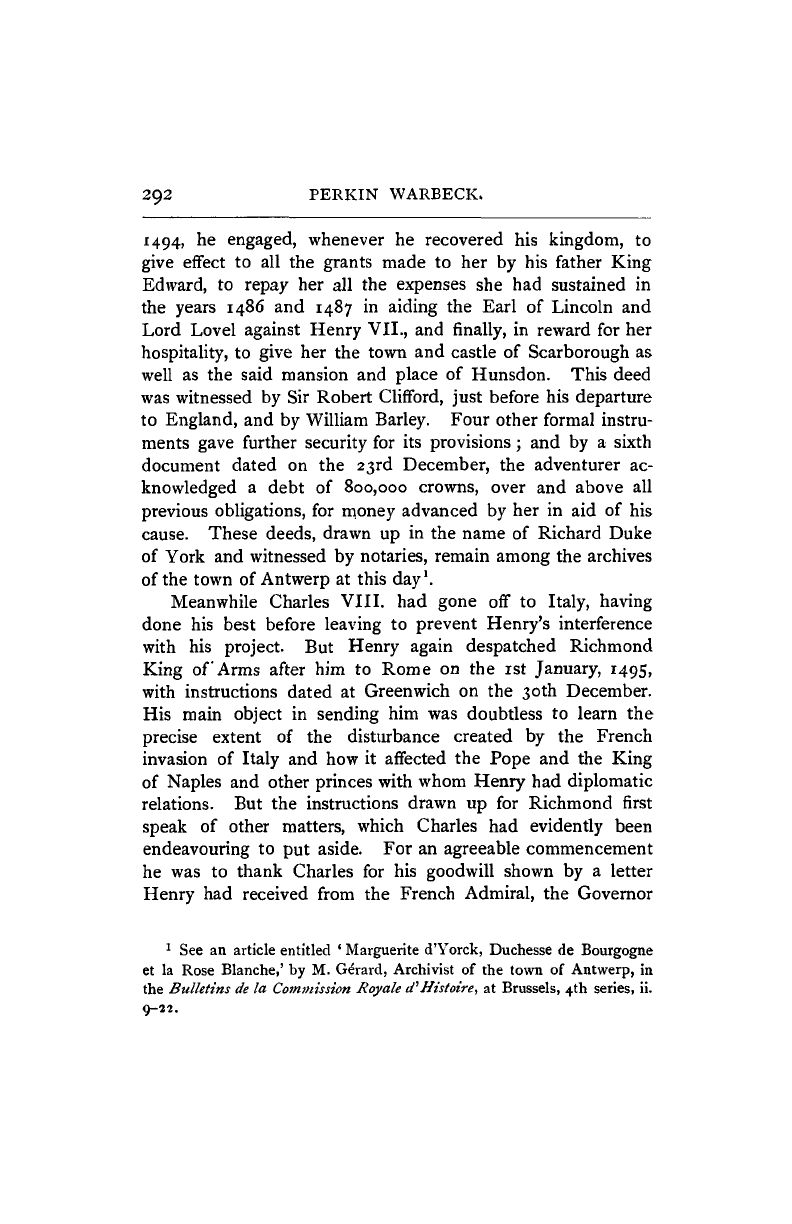
292 PERKIN WARBECK.
1494,
he engaged, whenever he recovered his kingdom, to
give effect to all the grants made to her by his father King
Edward, to repay her all the expenses she had sustained in
the years i486 and 1487 in aiding the Earl of Lincoln and
Lord Lovel against Henry VII., and finally, in reward for her
hospitality, to give her the town and castle of Scarborough as
well as the said mansion and place of Hunsdon. This deed
was witnessed by Sir Robert Clifford, just before his departure
to England, and by William Barley. Four other formal instru-
ments gave further security for its provisions; and by a sixth
document dated on the 23rd December, the adventurer ac-
knowledged a debt of 800,000 crowns, over and above all
previous obligations, for money advanced by her in aid of his
cause. These deeds, drawn up in the name of Richard Duke
of York and witnessed by notaries, remain among the archives
of the town of Antwerp at this day
1
.
Meanwhile Charles VIII. had gone off to Italy, having
done his best before leaving to prevent Henry's interference
with his project. But Henry again despatched Richmond
King of
Arms
after him to Rome on the 1st January, 1495,
with instructions dated at Greenwich on the 30th December.
His main object in sending him was doubtless to learn the
precise extent of the disturbance created by the French
invasion of Italy and how it affected the Pope and the King
of Naples and other princes with whom Henry had diplomatic
relations. But the instructions drawn up for Richmond first
speak of other matters, which Charles had evidently been
endeavouring to put aside. For an agreeable commencement
he was to thank Charles for his goodwill shown by a letter
Henry had received from the French Admiral, the Governor
1
See an article entitled ' Marguerite d'Yorck, Duchesse de Bourgogne
et la Rose Blanche,' by M. Gerard, Archivist of the town of Antwerp, in
the Bulletins de la Commission Royale d'Histoire, at Brussels, 4th series, ii.
0-22.
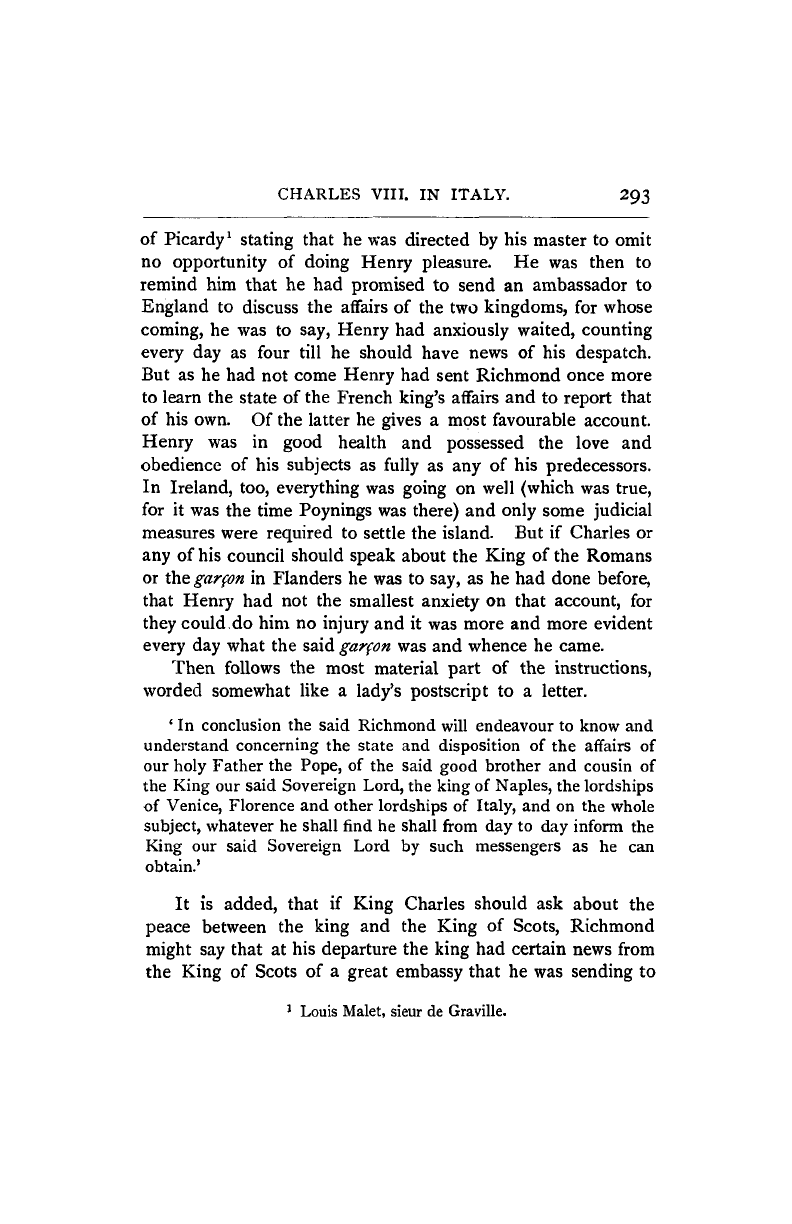
CHARLES VIII. IN ITALY. 293
of Picardy
1
stating that he was directed by his master to omit
no opportunity of doing Henry pleasure. He was then to
remind him that he had promised to send an ambassador to
England to discuss the affairs of the two kingdoms, for whose
coming, he was to say, Henry had anxiously waited, counting
every day as four till he should have news of his despatch.
But as he had not come Henry had sent Richmond once more
to learn the state of the French king's affairs and to report that
of his own. Of the latter he gives a most favourable account.
Henry was in good health and possessed the love and
obedience of his subjects as fully as any of his predecessors.
In Ireland, too, everything was going on well (which was true,
for it was the time Poynings was there) and only some judicial
measures were required to settle the island. But if Charles or
any of his council should speak about the King of the Romans
or the garpn in Flanders he was to say, as he had done before,
that Henry had not the smallest anxiety on that account, for
they could.do him no injury and it was more and more evident
every day what the said
garfon
was and whence he came.
Then follows the most material part of the instructions,
worded somewhat like a lady's postscript to a letter.
' In conclusion the said Richmond will endeavour to know and
understand concerning the state and disposition of the affairs of
our holy Father the Pope, of the said good brother and cousin of
the King our said Sovereign Lord, the king of Naples, the lordships
of Venice, Florence and other lordships of Italy, and on the whole
subject, whatever he shall find he shall from day to day inform the
King our said Sovereign Lord by such messengers as he can
obtain.'
It is added, that if King Charles should ask about the
peace between the king and the King of Scots, Richmond
might say that at his departure the king had certain news from
the King of Scots of a great embassy that he was sending to
1
Louis Malet, sieur de Graville.
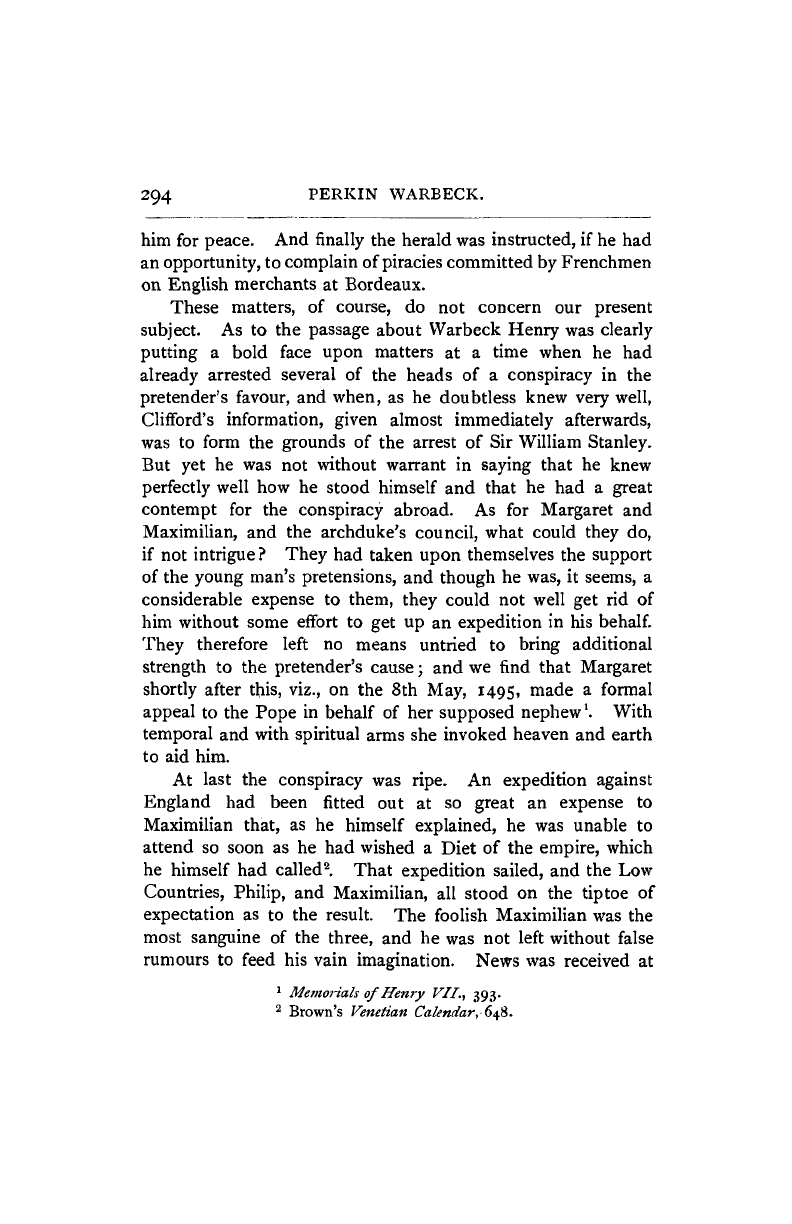
294 PERKIN WARBECK.
him for peace. And finally the herald was instructed, if he had
an opportunity, to complain of piracies committed by Frenchmen
on English merchants at Bordeaux.
These matters, of course, do not concern our present
subject. As to the passage about VVarbeck Henry was clearly
putting a bold face upon matters at a time when he had
already arrested several of the heads of a conspiracy in the
pretender's favour, and when, as he doubtless knew very well,
Clifford's information, given almost immediately afterwards,
was to form the grounds of the arrest of Sir William Stanley.
But yet he was not without warrant in saying that he knew
perfectly well how he stood himself and that he had a great
contempt for the conspiracy abroad. As for Margaret and
Maximilian, and the archduke's council, what could they do,
if not intrigue
?
They had taken upon themselves the support
of the young man's pretensions, and though he was, it seems, a
considerable expense to them, they could not well get rid of
him without some effort to get up an expedition in his
behalf.
They therefore left no means untried to bring additional
strength to the pretender's cause; and we find that Margaret
shortly after this, viz., on the 8th May, 1495, made a formal
appeal to the Pope in behalf of her supposed nephew
1
. With
temporal and with spiritual arms she invoked heaven and earth
to aid him.
At last the conspiracy was ripe. An expedition against
England had been fitted out at so great an expense to
Maximilian that, as he himself explained, he was unable to
attend so soon as he had wished a Diet of the empire, which
he himself had called
2
. That expedition sailed, and the Low
Countries, Philip, and Maximilian, all stood on the tiptoe of
expectation as to the result. The foolish Maximilian was the
most sanguine of the three, and he was not left without false
rumours to feed his vain imagination. News was received at
1
Memorials of Henry VII., 393.
2
Brown's Venetian Calendar, 648.
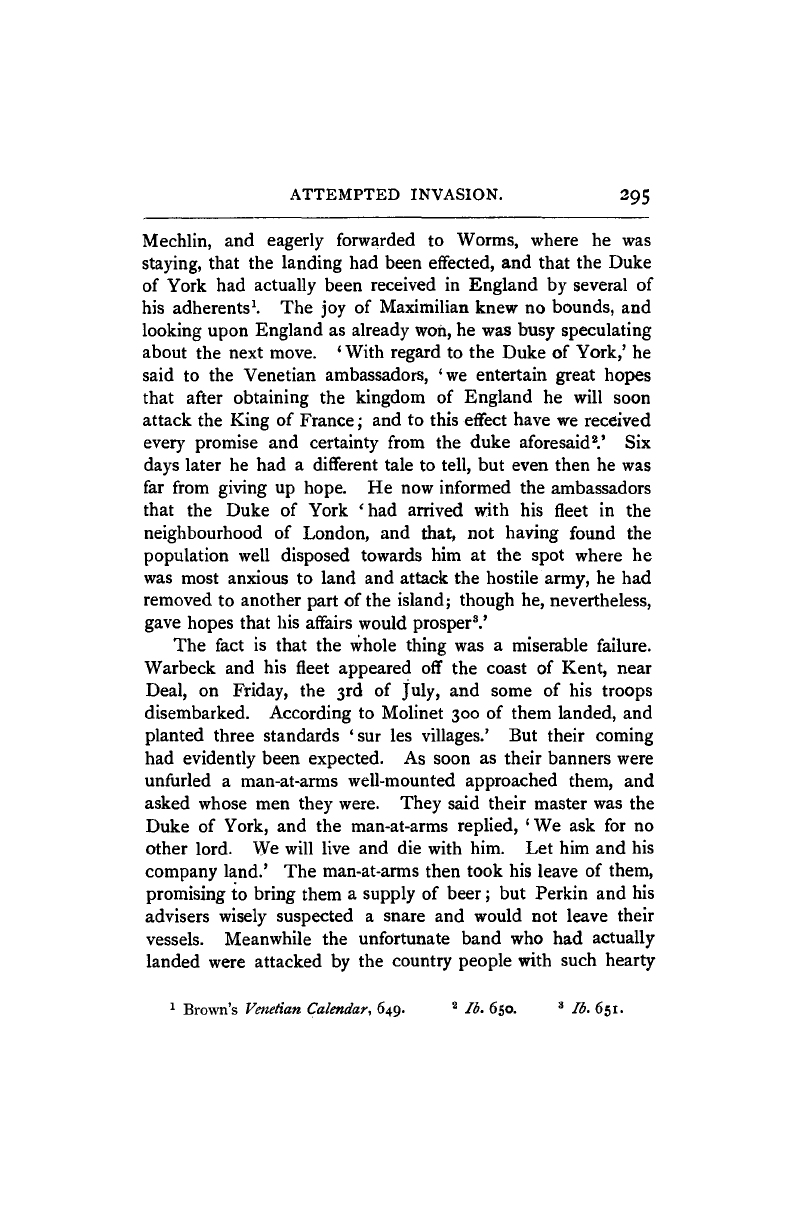
ATTEMPTED INVASION. 295
Mechlin, and eagerly forwarded to Worms, where he was
staying, that the landing had been effected, and that the Duke
of York had actually been received in England by several of
his adherents
1
. The joy of Maximilian knew no bounds, and
looking upon England as already won, he was busy speculating
about the next move. ' With regard to the Duke of York,' he
said to the Venetian ambassadors, 'we entertain great hopes
that after obtaining the kingdom of England he will soon
attack the King of France; and to this effect have we received
every promise and certainty from the duke aforesaid
2
.' Six
days later he had a different tale to tell, but even then he was
far from giving up hope. He now informed the ambassadors
that the Duke of York 'had arrived with his fleet in the
neighbourhood of London, and that, not having found the
population well disposed towards him at the spot where he
was most anxious to land and attack the hostile army, he had
removed to another part of the island; though he, nevertheless,
gave hopes that his affairs would prosper
3
.'
The fact is that the whole thing was a miserable failure.
Warbeck and his fleet appeared off the coast of Kent, near
Deal, on Friday, the 3rd of July, and some of his troops
disembarked. According to Molinet 300 of them landed, and
planted three standards 'sur les villages.' But their coming
had evidently been expected. As soon as their banners were
unfurled a man-at-arms well-mounted approached them, and
asked whose men they were. They said their master was the
Duke of York, and the man-at-arms replied, 'We ask for no
other lord. We will live and die with him. Let him and his
company land.' The man-at-arms then took his leave of them,
promising to bring them a supply of beer; but Perkin and his
advisers wisely suspected a snare and would not leave their
vessels. Meanwhile the unfortunate band who had actually
landed were attacked by the country people with such hearty
1
Brown's Venetian Calendar, 649.
s
Ib. 650.
3
Ib. 651.
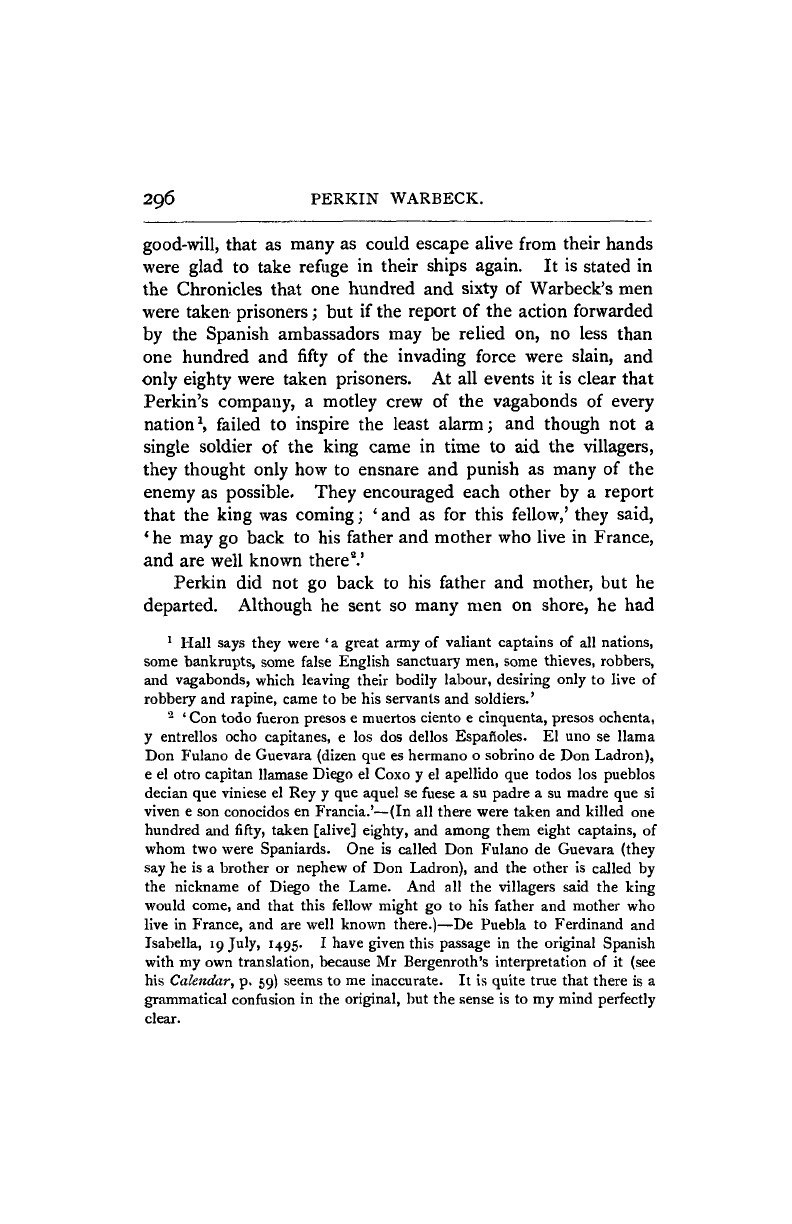
296 PERKIN WARBECK.
good-will, that as many as could escape alive from their hands
were glad to take refuge in their ships again. It is stated in
the Chronicles that one hundred and sixty of Warbeck's men
were taken prisoners; but if the report of the action forwarded
by the Spanish ambassadors may be relied on, no less than
one hundred and fifty of the invading force were slain, and
only eighty were taken prisoners. At all events it is clear that
Perkin's company, a motley crew of the vagabonds of every
nation
1
, failed to inspire the least alarm; and though not a
single soldier of the king came in time to aid the villagers,
they thought only how to ensnare and punish as many of the
enemy as possible. They encouraged each other by a report
that the king was coming; ' and as for this fellow,' they said,
' he may go back to his father and mother who live in France,
and are well known there
2
.'
Perkin did not go back to his father and mother, but he
departed. Although he sent so many men on shore, he had
1
Hall says they were 'a great army of valiant captains of all nations,
some bankrupts, some false English sanctuary men, some thieves, robbers,
and vagabonds, which leaving their bodily labour, desiring only to live of
robbery and rapine, came to be his servants and soldiers.'
2
' Con todo fueron presos e muertos ciento e cinquenta, presos ochenta,
y entrellos ocho capitanes, e los dos dellos Espafioles. El uno se llama
Don Fulano de Guevara (dizen que es hermano o sobrino de Don Ladron),
e el otro capitan Uamase Diego el Coxo y el apellido que todos los pueblos
decian que viniese el Rey y que aquel se fuese a su padre a su madre que si
viven e son conocidos en Francia.'—(In all there were taken and killed one
hundred and fifty, taken [alive] eighty, and among them eight captains, of
whom two were Spaniards. One is called Don Fulano de Guevara (they
say he is a brother or nephew of Don Ladron), and the other is called by
the nickname of Diego the Lame. And all the villagers said the king
would come, and that this fellow might go to his father and mother who
live in France, and are well known there.)—De Puebla to Ferdinand and
Isabella, 19 July, 1495. I have given this passage in the original Spanish
with my own translation, because Mr Bergenroth's interpretation of it (see
his Calendar, p. 59) seems to me inaccurate. It is quite true that there is a
grammatical confusion in the original, but the sense is to my mind perfectly
clear.
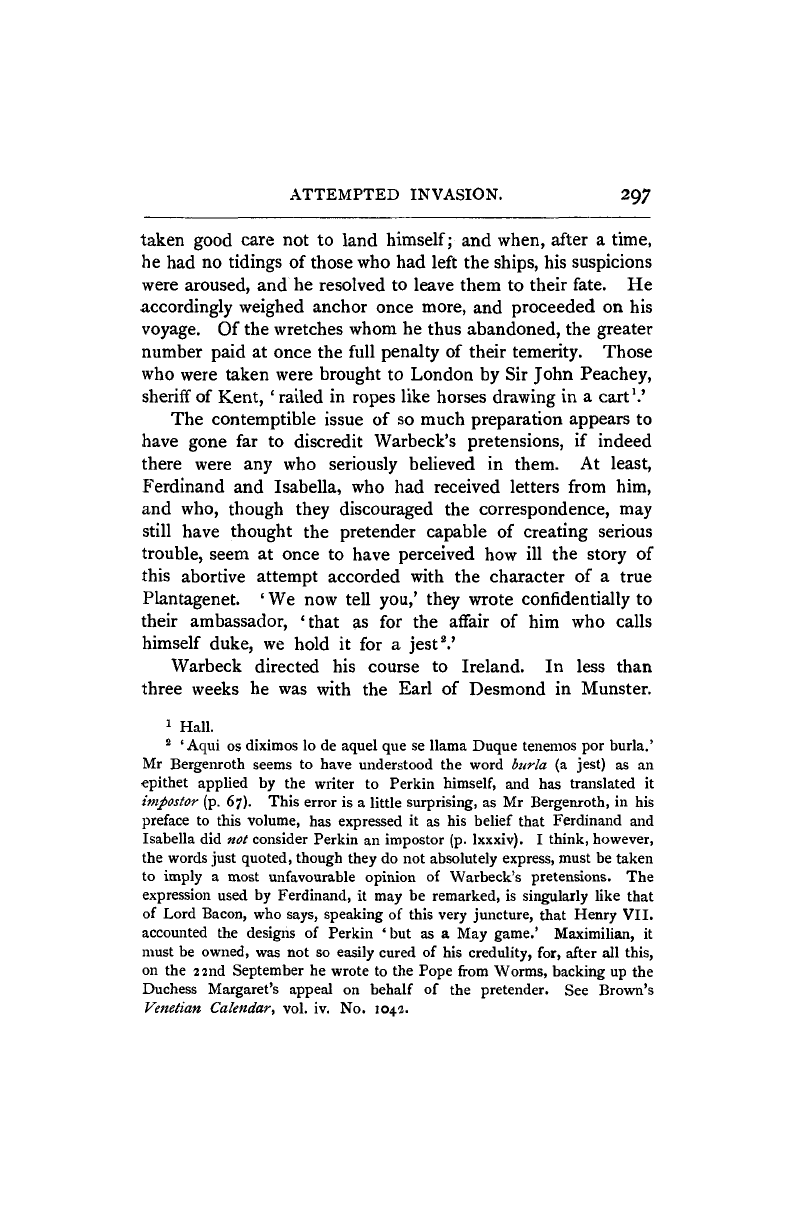
ATTEMPTED INVASION. 297
taken good care not to land
himself;
and when, after a time,
he had no tidings of those who had left the ships, his suspicions
were aroused, and he resolved to leave them to their fate. He
accordingly weighed anchor once more, and proceeded on his
voyage. Of the wretches whom he thus abandoned, the greater
number paid at once the full penalty of their temerity. Those
who were taken were brought to London by Sir John Peachey,
sheriff of Kent, ' railed in ropes like horses drawing in a cart
1
.'
The contemptible issue of so much preparation appears to
have gone far to discredit Warbeck's pretensions, if indeed
there were any who seriously believed in them. At least,
Ferdinand and Isabella, who had received letters from him,
and who, though they discouraged the correspondence, may
still have thought the pretender capable of creating serious
trouble, seem at once to have perceived how ill the story of
this abortive attempt accorded with the character of a true
Plantagenet. ' We now tell you,' they wrote confidentially to
their ambassador, 'that as for the affair of him who calls
himself duke, we hold it for a jest
2
.'
Warbeck directed his course to Ireland. In less than
three weeks he was with the Earl of Desmond in Munster.
1
Hall.
2
' Aqui os diximos lo de aquel que se llama Duque tenemos por burla.'
Mr Bergenroth seems to have understood the word burla (a jest) as an
epithet applied by the writer to Perkin
himself,
and has translated it
impostor (p. 67). This error is a little surprising, as Mr Bergenroth, in his
preface to this volume, has expressed it as his belief that Ferdinand and
Isabella did not consider Perkin an impostor (p. Ixxxiv). I think, however,
the words just quoted, though they do not absolutely express, must be taken
to imply a most unfavourable opinion of Warbeck's pretensions. The
expression used by Ferdinand, it may be remarked, is singularly like that
of Lord Bacon, who says, speaking of this very juncture, that Henry VII.
accounted the designs of Perkin 'but as a May game.' Maximilian, it
must be owned, was not so easily cured of his credulity, for, after all this,
on the 22nd September he wrote to the Pope from Worms, backing up the
Duchess Margaret's appeal on behalf of the pretender. See Brown's
Venetian Calendar, vol. iv. No. 1042.
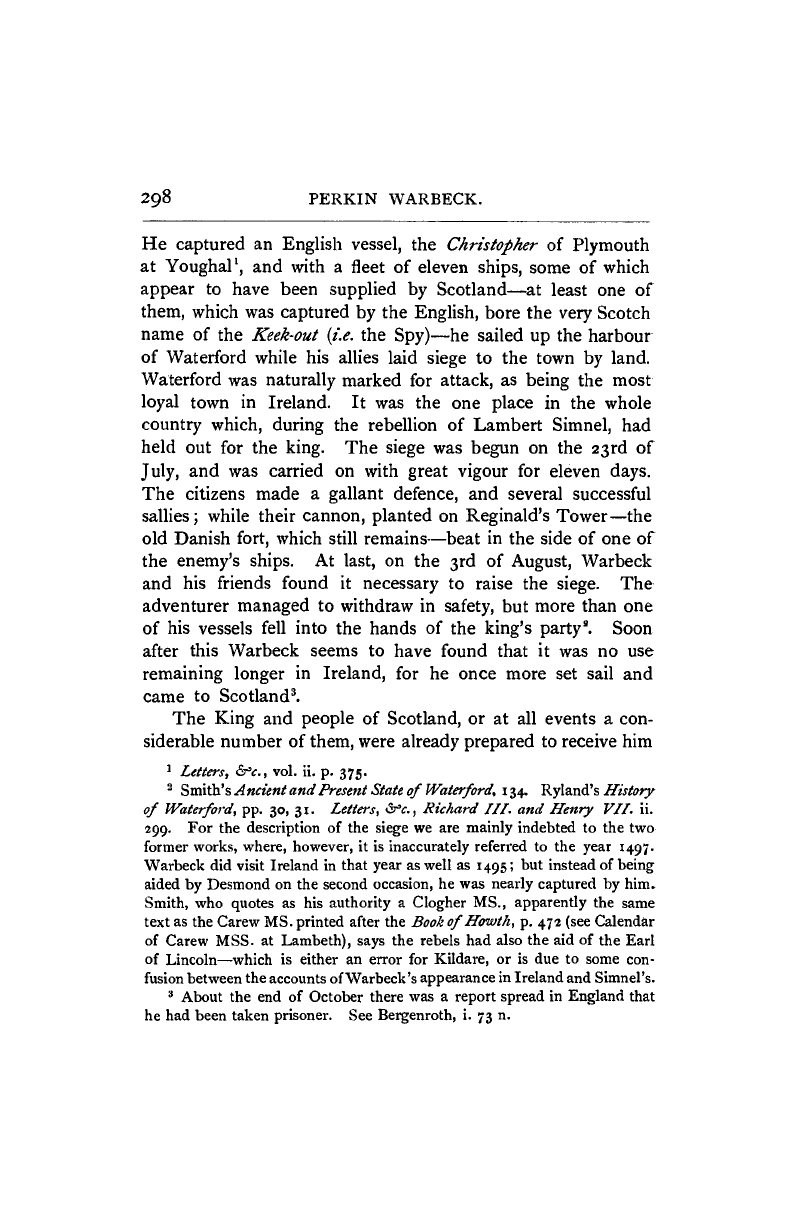
298 PERKIN WARBECK.
He captured an English vessel, the Christopher of Plymouth
at Youghal
1
, and with a fleet of eleven ships, some of which
appear to have been supplied by Scotland—at least one of
them, which was captured by the English, bore the very Scotch
name of the Keek-out
(i.e.
the Spy)—he sailed up the harbour
of Waterford while his allies laid siege to the town by land.
Waterford was naturally marked for attack, as being the most
loyal town in Ireland. It was the one place in the whole
country which, during the rebellion of Lambert Simnel, had
held out for the king. The siege was begun on the 23rd of
July, and was carried on with great vigour for eleven days.
The citizens made a gallant defence, and several successful
sallies; while their cannon, planted on Reginald's Tower—the
old Danish fort, which still remains—beat in the side of one of
the enemy's ships. At last, on the 3rd of August, Warbeck
and his friends found it necessary to raise the siege. The
adventurer managed to withdraw in safety, but more than one
of his vessels fell into the hands of the king's party*. Soon
after this Warbeck seems to have found that it was no use
remaining longer in Ireland, for he once more set sail and
came to Scotland
3
.
The King and people of Scotland, or at all events a con-
siderable number of them, were already prepared to receive him
1
Letters, &=c, vol. ii. p. 375.
2
Smith's Ancientand Present State of'Waterford, 134. Ryland's History
of Waterford, pp. 30, 31. Letters, &°c, Richard HI. and Henry VII. ii.
299.
For the description of the siege we are mainly indebted to the two
former works, where, however, it is inaccurately referred to the year 1497.
Warbeck did visit Ireland in that year as well as 1495; but instead of being
aided by Desmond on the second occasion, he was nearly captured by him.
Smith, who quotes as his authority a Clogher MS., apparently the same
text as the Carew MS. printed after the Book of Howth, p. 472 (see Calendar
of Carew MSS. at Lambeth), says the rebels had also the aid of the Earl
of Lincoln—which is either an error for Kildare, or is due to some con-
fusion between the accounts of Warbeck's appearance in Ireland and Simnel's.
3
About the end of October there was a report spread in England that
he had been taken prisoner. See Bergenroth, i. 73 n.
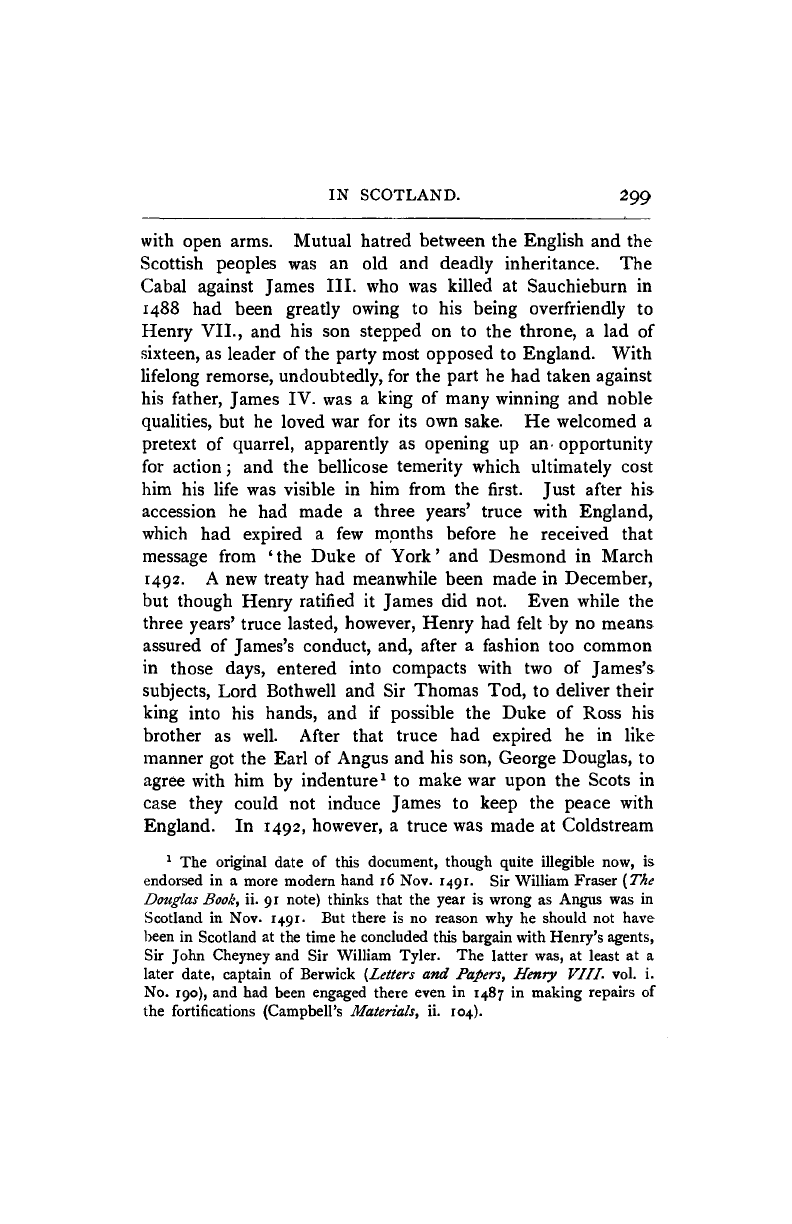
IN SCOTLAND. 299
with open arms. Mutual hatred between the English and the
Scottish peoples was an old and deadly inheritance. The
Cabal against James III. who was killed at Sauchieburn in
1488 had been greatly owing to his being overfriendly to
Henry VII., and his son stepped on to the throne, a lad of
sixteen, as leader of the party most opposed to England. With
lifelong remorse, undoubtedly, for the part he had taken against
his father, James IV. was a king of many winning and noble
qualities, but he loved war for its own sake. He welcomed a
pretext of quarrel, apparently as opening up
an •
opportunity
for action; and the bellicose temerity which ultimately cost
him his life was visible in him from the first. Just after his
accession he had made a three years' truce with England,
which had expired a few months before he received that
message from 'the Duke of York' and Desmond in March
1492.
A new treaty had meanwhile been made in December,
but though Henry ratified it James did not. Even while the
three years' truce lasted, however, Henry had felt by no means
assured of James's conduct, and, after a fashion too common
in those days, entered into compacts with two of James's
subjects, Lord Bothwell and Sir Thomas Tod, to deliver their
king into his hands, and if possible the Duke of Ross his
brother as well. After that truce had expired he in like
manner got the Earl of Angus and his son, George Douglas, to
agree with him by indenture
1
to make war upon the Scots in
case they could not induce James to keep the peace with
England. In 1492, however, a truce was made at Coldstream
1
The original date of this document, though quite illegible now, is
endorsed in a more modern hand 16 Nov. 1491. Sir William Fraser (The
Douglas Book, ii. 91 note) thinks that the year is wrong as Angus was in
Scotland in Nov. 1491. But there is no reason why he should not have
been in Scotland at the time he concluded this bargain with Henry's agents,
Sir John Cheyney and Sir William Tyler. The latter was, at least at a
later date, captain of Berwick (Letters and Papers, Henry
VIII.
vol. i.
No.
190), and had been engaged there even in 1487 in making repairs of
the fortifications (Campbell's Materials, ii. 104).
